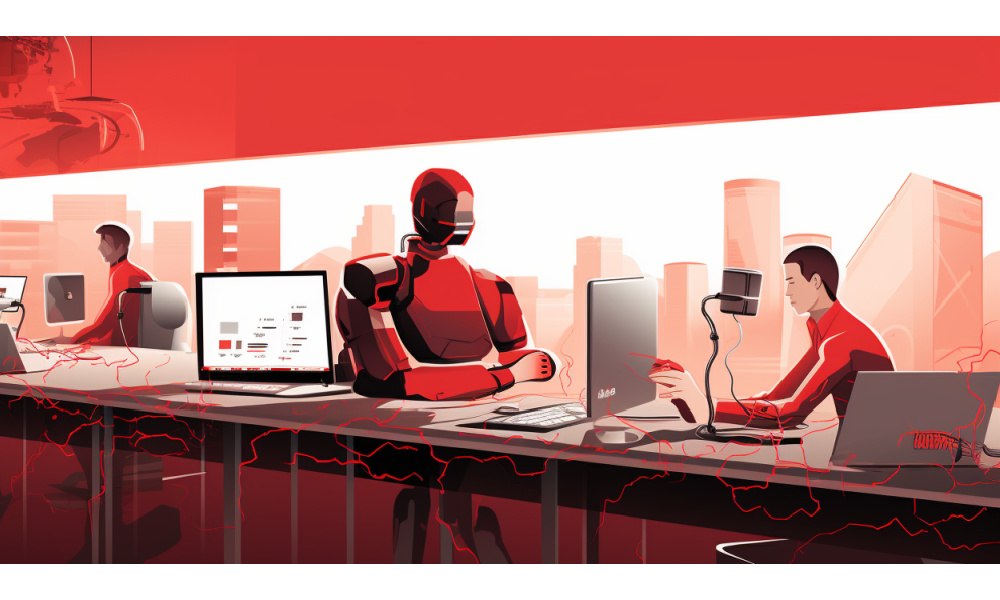Bringing humanity back in the age of automation
- 6 Min Read
Automation reshapes workplaces, but prioritizing human creativity and interaction ensures balance in this rapidly evolving digital landscape
- Author: HRD Connect
- Date published: Oct 27, 2023
- Categories

As automation continues to reshape the modern workplace at an unprecedented pace, HR seniors are scrambling to get their organizations ahead of the ever-evolving curve. With artificial intelligence (AI) becoming increasingly integrated into workplaces worldwide, there is a growing concern that it will lead to the dehumanization of work, deprive employees of creativity, growth opportunities, and personal interactions. How can HR professionals effectively manage this organizational change along with building a robust foundation for digital transformation? In what ways can HR leaders redefine job roles and responsibilities to emphasize the value of human input, creativity, and interpersonal skills to stay competitive amid the tech revolution?
On Tuesday, October 3, 2023, The HRD Collective hosted a panel discussion consisting of Dan Hutchinson, Vice President at Schneider Electric, Rudolph Wontumi, Senior Vice President of HR & Corporate Services at JCB International, as well as Jan Laurijssen, HR Evangelist, Researcher & Consultant at SD Worx. Moderated by Dr. Dieter Veldsman, Chief Scientist, Human Resources and Organizational Design at AIHR, the panel tackled the topic of how to “navigate the skills revolution by building a future-ready workforce.”
The challenge of AI and automation
Dr. Veldsman kicked off the conversation by presenting the challenges associated with leveraging automation and AI for increased efficiency while aiming to preserve and enhance the human element in the workplace. Hutchinson, VP at Schneider Electric, went on to detail the issues that businesses are facing in digitization and sustainability trends, driving a shift toward automation and technology. He mentioned an important focus on enabling assets to be better connected to support sustainability goals. Hutchinson also suggested that HR leaders must start with strong workforce planning to upskill, reskill, and source talent effectively. Social connections and collaboration remain essential, with a balance between remote and in-office work.
Additionally, Hutchinson emphasized that even with automation and chatbots in place, human interaction remains crucial in delivering employee support. Emotional intelligence and human judgment are still vital for certain aspects of employee needs.
Continuing the discussion on the value of the human experience, Laurijssen, underlined the importance of employee experience and the need to engage with employees in a way that feels both human and digital. He highlighted that employees expect digital communication and connection through apps. This should encourage HR to focus on being more human in their interactions. He shared the idea that people view automation and AI as complementary rather than contradictory, and they recognize the opportunities they bring. Thus, the goal is to create a mutual gain for both employers and employees.
The impact of automation on jobs and employability
Laurijssen highlighted the potential impact of automation on jobs, citing research that suggests about 27% of jobs could undergo radical changes or disappear in the coming years. This underscores the importance of building employability that encompasses both digital and human skills. Laurijssen emphasized that what makes us uniquely human, such as problem-solving, analytical, synthetic, communication, and collaboration skills, should be celebrated and leveraged. These skills complement technology, and individuals need to focus on learning, unlearning, and relearning. Employability in the digital era requires ongoing efforts in communication, change management, and learning and development.
Ethical considerations of AI
Wontumi addressed the ethical debates surrounding AI and automation. He highlighted the three prevailing schools of thought: those advocating for widespread AI adoption, those opposing it entirely, and the middle ground of responsible adoption. Wontumi stressed the importance of coexistence between humans and AI, emphasizing that AI should not only be about efficiency but also reskilling and upskilling people. He underscored the need for organizations to establish guidelines on AI use, focusing on fairness, transparency, privacy, and discrimination. Regular audits and assessments, as well as third-party evaluations, were suggested to ensure ethical AI implementation.
Hutchinson echoed Wontumi’s words, expressing that trust in AI implementation begins with transparency. Organizations must be clear about data collection, managing bias, and protecting privacy. He highlighted the importance of leadership in fostering a culture of trust and emphasized that employees should be seen as talents with access to learning opportunities. Trust is also nurtured through an open, trusting environment and capturing the employee voice.
Adapting to conquer
The panel discussed strategies for preparing the workforce. Education and commitment from senior leadership were highlighted as critical factors. Wontumi stressed that organizations should help employees understand the “what’s in it for me?” aspect of digitalization, emphasizing how it enhances value rather than replacing jobs. Aligning digitalization with company values and values-based communication were suggested to facilitate workforce adaptation and evolution.
Laurijssen added the importance of employees recognizing their transferable skills and adapting to evolving roles. This adaptation involves understanding why changes are happening, what benefits they bring, and how employees can actively participate in the transformation, contributing value in new ways.
Flexibility and efficiency: A fine balance
The panel went on to tackle the importance of balancing flexibility with efficiency in the workplace. They emphasized that introducing new technology should also come with increased support and flexibility for employees. Driving greater value and efficiency should go hand in hand with accommodating the changing work dynamics. Leading the way through these evolving circumstances, the panel acknowledged the essential nature of a shift in leadership mentality during the age of digital transformation. Leaders should understand how technology can help, be transparent in communication, and model the behavior they want to see in their teams. Moderator Veldsman highlighted the role of leaders in using digital tools for HR functions and fostering human connections.
An audience member asked the panel to share innovative tech solutions they have adopted or are thinking about using. The panel mentioned a few interesting innovations, such as platforms that can match people’s skills to projects, mentoring programs, and tools for sustainable career management. They also said that people analytics can be used to make data-driven decisions about how to improve the employee experience and keep a good balance.
Conclusion
The panel discussion emphasized the human-centric approach to digital transformation, the need for a leadership mindset shift, and the importance of innovative and ethical tech solutions. A shift toward sustainable career management and transparency in HR processes is essential, now and in the future. The conversation overall highlighted the need to embrace this change as an opportunity for growth.
Reprising sentiments shared by Laurijssen, “the role of technology should be to enhance the well-being and employability of employees”. If organizations can effectively integrate technology while keeping humans at the center of their strategies, the future holds great promise.
SD Worx is a leading provider of HR solutions that help organizations put people first. If you’re looking for an HR partner that can help you use technology to create a better workplace for your employees, visit sdworx.co.uk to discover their range of solutions
SD Worx have created a four-stage journey that encourages management teams to assess where they should be focusing their attention. Discover your profile here and gain insights on how to evolve your HR strategy.









